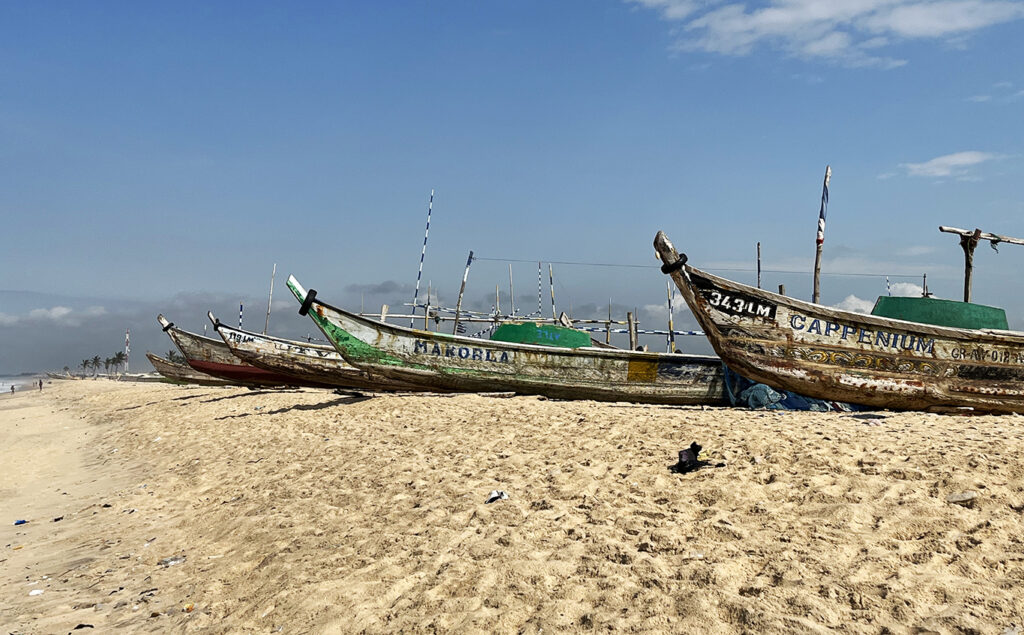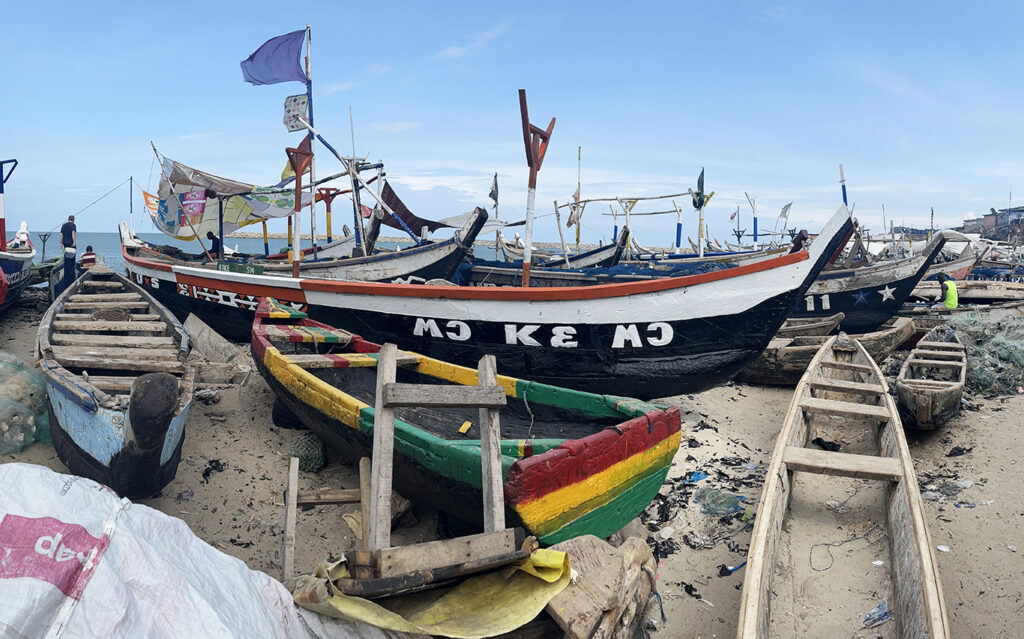Hooking a new livelihood? Collapse of West Africa fisheries forces adaptation
In many coastal communities, fish mean jobs.
Along the Gulf of Guinea in West Africa, a region where most people live below the international poverty line, fish have been one of the few dependable livelihoods for generations.
Now the fish are disappearing, leaving behind worry and questions about the future.
“These fishing families are poor to begin with. But surveys show that perceived quality of life declined between 2015 and 2019. Household hunger increased. Women’s dietary diversity decreased,” said Robert Paarlberg, Associate in the Sustainability Science Program at the Harvard Kennedy School, during a February 8 climate research workshop at the Salata Institute.
The data are stark. In Côte d’Ivoire, the coastal catch fell nearly 40 percent between 2003-2020. In Ghana, landings of small fish dropped 59 percent between 1993-2019. In Nigeria, where trends are believed similar, artisanal fishing supports the livelihoods of 24 million people. Projections to 2050 in the three countries suggest this century’s haul could continue to plunge another 50 percent.

As the baleful impact of this troubling truth dawns, Paarlberg is part of a team focused on solutions.
A co-investigator on the Climate Adaptation in the Gulf of Guinea research cluster sponsored by the Salata Institute for Climate and Sustainability at Harvard University, Paarlberg is studying how to foster alternative livelihoods so these communities survive. Without support from policymakers, a wrenching transition threatens to increase poverty, undermine fragile governments, and unleash a new wave of desperate emigrants.
The causes of the fishery collapse are manifold: ocean warming, illegal fishing by foreign trawlers, and overfishing on artisanal canoes.
Ocean warming, largely a problem created by burning fossil fuels in the rich world, is prompting local species to migrate to cooler waters.
“These migrations at sea in response to temperature changes can occur seven times as fast as migrations of terrestrial species. So, if you’re a coastal fishing community that stays in one place, the migrations can get you in trouble in a hurry,” said Paarlberg, who is also Emeritus Professor of Political Science at Wellesley College.
Yet even without ocean warming, overfishing alone can threaten a fishery, and in the Gulf of Guinea, overfishing comes in two forms.
“When we talk to fishing communities and ask them, ‘What problems are you facing as fishermen?’ it’s amazing how many start by mentioning Chinese trawlers. That surprised me,” said Paarlberg, who is conducting field surveys in Côte d’Ivoire, Ghana, and Nigeria this spring. “They’re aware that this is a threat to their fishery. It shouldn’t be a threat because the laws in countries like Ghana prohibit foreign trawlers, but there’s always a workaround.”
With Chinese trawlers, it is not just bribes causing officials to look the other way, but something more corrosive, Paarlberg explained: “Chinese trawlers make deals with front companies owned by African elites. The elites then use some of that money to fund the political party that happens to be in power. And that transactional arrangement buys the Chinese freedom to continue doing what they’re doing.” Ninety percent of trawlers licensed in Ghana are Chinese-owned vessels using Ghanaian firms as fronts, the Environmental Justice Foundation, a British charity, has found.
Many Chinese trawlers also violate size restrictions and take juvenile fish that haven’t yet had a chance to reproduce, accelerating the fish stock decline, campaigners have shown.
Just as deleterious for the fish stocks is the rapid human population increase on the coast, where impoverished rural residents head in search of work. This increases local demand for fish, and the number of traditional canoes in use in Ghana has almost doubled since 1990; across West Africa the total has surged sevenfold since 1950. “This is part of the problem not because the canoes catch a lot of fish individually but because there are so many more canoes now fishing,” said Paarlberg. All three governments are wrestling with how to preserve the stocks. In 2012, Nigeria stopped subsidizing outboard fuel. Ghana, which heavily discounts fuel and subsidizes gear, has begun a closed season in July for all boats; Côte d’Ivoire has done the same. Ghanaian officials say this strategy – although creating new economic burdens for impoverished fishing families – has been successful, but they have not shared data to support the claim.

Education is the future
Even if overfishing is reduced, ocean warming would continue to reduce catch potential – a certainty impossible to reverse in the short-term.
Based on his experience with alternative livelihood programs elsewhere, Paarlberg believes it would be costly and difficult to phase out fishing by retraining adults – in Ghana and Nigeria 40 percent of fishing household heads have no formal education. Instead, he argues, the governments must encourage families to keep their children longer in school. Formal education will diversify kids’ opportunities.
The transition will be challenging. “There’s not a strong tradition of staying in school,” he said. “The young boys stay home to help mend the nets; the young girls help their mothers smoke and market the fish. So, there’s a huge opportunity cost associated with keeping your children in school.”
Paarlberg recommends governments continue to drop school fees and also, possibly with foreign aid, offer conditional cash transfers to families who keep their children in school: “In Latin America we’ve learned that a monthly cash transfer to households conditioned on keeping their children in school, and getting them to a clinic periodically, can produce results, raising enrollments by as much as 60 percent.”
As a next step, Paarlberg’s surveys will help his team learn more about fishing families’ perceptions of livelihood alternatives, and measure their experiences with flooding, coastal erosion, and sea-level rise. In 2025, the Salata Institute hopes to sponsor a symposium in each of these three countries to present the findings and recommendations to local stakeholders.








